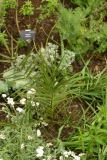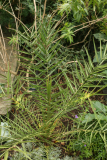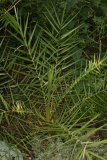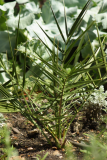Additional notes (click to expand)
Commemorative
This is the prickly-leaved, Cretan Date Palm which commemorates the Greek philospher/
botanist/herbalist Theophrastus/Theophrastos (371–287 BC) (his real name was Tyrtamus), the
‘father of botany’ who wrote on the medicinal properties of plants. He was born at Eresos on the island of Lesbos and studied under Plato in Athens. When Aristotle was forced to flee Athens in
322 BC because of his support for the Macedonians, he gave his books and the leadership of the Lyceum (school) in Athens to Theophrastus, who continued there for 35 years until his death
in AD 287. Theophrastus was the author of Characters (319 BC) which contains descriptions of moral types, and of On the causes of plants and Enquiry into plants (latter in two vols, Loeb edition, 1980), the two most important botanical books of antiquity. In book nine of the Inquiry (re Juices of plants and Medicinal properties of plants), Theophrastus discusses medicinal herbs. Here he gives the many uses of cyclamen including, ‘they say also that the [ashes of the] root is a good charm for inducing rapid delivery and as a love potion’. When excavating the ruins of Pompey, a room was found which had been used as a pharmacy and contained cyclamen corms. It was noted that the local Italian workmen on the site would remove the cyclamen from the ground before excavating and take them home for ‘medicinal purposes’ – a tradition which Theophrastus had documented 2,300 years before (Jashemski, 1999). His classification of plants was, basically, trees, shrubs, under-shrubs and herbs with a subdivision (which was still used in part by Johnson in 1633) of cultivated and wild, with and without flowers, deciduous and evergreen. Volume two of the Inquiry also treats of perfumes, spices and the meteorological signs for rain, wind and fair weather.
Oakeley, Dr. Henry. (2012). Doctors in the Medicinal Garden. Plants named after physicians. Royal College of Physicians.
link
Other use
Phoenix theophrasti is a small palm which, in limited places in the Mediterranean, forms small forests – unique among Europe’s palms. The dates are edible, but bitter and fibrous so of no commercial value. ■
Oakeley, Dr. Henry. (2012). Doctors in the Medicinal Garden. Plants named after physicians. Royal College of Physicians.
link
Geographical distribution
- Asia-Temperate, Western Asia, Turkey
- Europe, Southeastern Europe, Greece
Phoenix theophrasti Greuter
Family: ARECACEAEGenus: Phoenix
Species: theophrasti Greuter
Common names: Cretan Date Palm
Distribution summary: Crete to S.W.Turkey
Habit: Shrub
Hardiness: H3 - Half hardy; unheated greenhouse/mild winter
Garden status: Currently grown
Garden location: Plants in pots (POT)
Reason for growing: Commemorative




